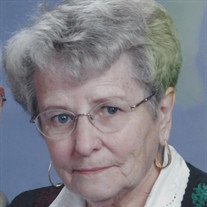Lillian Grissen
Life Dates: b. 1922, d. October 31, 2015
Full Name: Lillian V. Grissen
Birthplace: Grand Rapids, MI
Tags: Arts, Education, Religion, Oral History
Lillian Grissen was an author, teacher, and church advocate who persevered in the face of crippling depression.
Lillian Grissen was raised in a Dutch family in Grand Rapids. She raised in a highly traditional environment, her mother instilled in her from a young age that “femaleness meant simply that you were a wife and a mother and that was all there was to do with life.” In spite of the attitudes she was raised around, Lillian always wanted an education. When she had a chance to attend college to become a teacher, her family could not afford to send her. It was “the biggest disappointment of [her] whole life.” Instead, after graduating high school, she worked as a legal secretary to help support the family.
While beginning her own family, misfortune struck. Soon after she married her husband, Raymond, they were separated. Pearl Harbor occurred just two weeks after their wedding, and Raymond was called into service. He was gone for three and a half years. Although it was difficult, according to her, “everyone was in that boat… if you still had a husband who was alive and well, you were grateful.” After Raymond’s return from the war, they had four children, three girls and one boy.
Raymond was “adventurous.” Responding to an ad in their church paper, Raymond and Lillian decided to embark on a mission trip to Nigeria with three small children and one on the way. On the mission, Lillian had a “nervous breakdown” because of her illness with her pregnancy and the culture shock of living in a new country. The family had to cut the mission short and Lillian, who was struggling with extreme depression, found treatment at Pine Rest.
Lillian’s severe depression caused her to be hospitalized on multiple occasions. She struggled immensely, unable to care for her children full time. After her breakdown in Nigeria, she began going to therapy and realized she was “very, very angry” about her upbringing, particularly that she was never able to receive the education she wanted. Although she struggled mightily with her depression, working through it was the “critical watershed” that pushed her to return to college.
The family lived in Grand Rapids for five years after their return from Nigeria. After the turmoil of the previous years, the family sought a change. They packed up and moved to Arizona, where Lillian started her education. She attended classes on TV, in night school, and summer school. Two years into her education journey, she was offered a job teaching in Arizona without a degree.
As the sixties rolled around, with men returning from service and receiving college degrees subsidized by the G.I. Bill, her and other “undegreed” teachers “saw the handwriting on the wall.” Lillian decided to finish out her degree. Tuition was expensive, especially with one child already in college, so the family borrowed money as an investment in Lillian’s career. She received her bachelor’s degree in English from the University of Arizona. Later, she received her master’s degree at age 55.
Eventually, Lillian paired her enthusiasm for education and her devotion for her faith, working as the editor of the Christian Educators Journal for six years. During a short stint when she and her husband lived in Iowa, she also worked with college students on the Dordt College newspaper.
After Raymond retired at 62, the couple decided to move back to Grand Rapids. Lillian got a job at Christian Reformed Publishing. As she was introduced to the publishing world, Lillian began writing.
During the 1960s and 1970s, the question of whether or not women could be ordained caused upheaval in the Christian Reformed Church. Lillian, who had gotten “caught up… in the feminist movement,” was requested to write a book about the history of women in office in the Christian Reformed Church. She eventually published five total books, including her most popular work, A Path Through the Sea, a memoir about recovering from depression.
While she was writing, Lillian was also involved in her community. Volunteering for Grace Community Church, an “inner-city church” in the “forgotten” area of Grand Rapids between 131 and Jefferson, Lillian aimed to bring more life to the area. Many people commuted to the church and did not live in the neighborhood. With the church goer’s volunteer efforts, they added classroom buildings, a head start program, and medical ministries in an attempt to get people moving to and talking about the area.
In spite of her traditional upbringing and struggles with depression, Lillian Grissen pursued the things she was truly passionate about – education, writing, and community service. In pursuing education, sharing her voice and investing in community growth, Lillian enriched both her own life and countless others.
Sources
This biography is adapted from a transcript of an oral history interview with Lillian Grissen. To find out more about Grand Rapids women’s oral histories, click here.
“Lillian Grissen.” Grand Rapids Press, November 11, 2015. https://obits.mlive.com/us/obituaries/grandrapids/name/lillian-grissen-obituary?id=17109326

